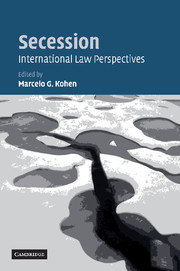Book contents
Introduction
Published online by Cambridge University Press: 23 July 2009
Summary
The relationship between secession and international law is a subject that has long attracted the interest of jurisprudence. The emergence of a new State to the detriment of an older sovereign entity disrupts the composition of international society and challenges the very foundations of its main actors. At the time of the creation of the new independent States in the Americas during the eighteenth and nineteenth centuries, the idea of – and consequently, the term – ‘decolonisation’ did not exist. Hence, the process of what was the first phenomenon of independence of colonies from their European metropolises took the form of secession. In other words, these new States were not created as a result of the existence of any right to independence under international law. Their existence came into being as a matter of fact and of recognition by the other members of the more limited community of States of the time.
This approach drastically changed during the United Nations era. Decolonisation, the most important means of creation of new States during the second half of the twentieth century, was not viewed by the international legal order as a case of secession. One of the reasons for this is summarised in the Declaration of Principles of International Law embodied in UNGA Resolution 2625 (XXV): ‘the territory of a colony or other non-self-governing territory has, under the Charter, a status separate and distinct from the territory of the State administering it’.
- Type
- Chapter
- Information
- SecessionInternational Law Perspectives, pp. 1 - 20Publisher: Cambridge University PressPrint publication year: 2006
- 8
- Cited by

